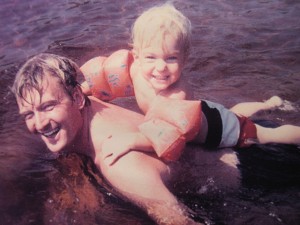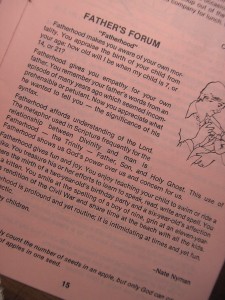God was good to us on September 25, 1982, the day we met newborn Hans Tomas Nyman. Because he followed his older brother Klaus by only 16 months, we were delighted he was a boy-buddy, even though six year old Linnea was furious with me for having given birth to yet another brother.
Hans, a little guy who never gave us a lick of trouble, turned out to be a high school kid who was cerebral like his father but also scatterbrained like his mother. Nate used to laugh with gusto every time he told the story of student-Hans pacing back and forth in the kitchen. “It’s due! It’s due!” he said, knitting his brow with anxiety.
“What’s due?” Nate asked.
“I don’t remember what, but it’s due!”
That was Hans. Paychecks from his part time job would come through the wash in his jeans pockets, and he’d often sleep with his clothes on, a half-full glass of water teetering on the mattress next to him. His passion was drumming, and after several years of listening to him beg, we gifted him with a borrowed set of practice pads for Christmas, along with a coupon for lessons. By the time he received his first real drum nearly a year later, he’d proven to be diligent in practice and faithful to the house-rules-for-noise.
When he reached adulthood, Hans could hit almost anything and coax music from it: a marimba, African drums, cymbals, timpani, chimes, bells, a piano and his favorite, the drum kit (a full set of five drums with cymbals). He managed the quads in the school marching band and belonged to several other school bands, along with the church orchestra. He also had his own band.
Although Hans never stopped drumming, somewhere in his early twenties, he began leaning hard into his love for reading, choosing to concentrate on the Bible and C. S. Lewis. His faith in Christ blossomed, and percussion slipped to second place. I vividly recall a week during this time when we were housing 28 “Youth With A Mission” students for a week, as they passed through the Chicago area.
These YWAMers were creating dinner for all of them and us in our kitchen, insisting I not help, so I stood off to the side, observing the over-filled room. Suddenly, through the crowd I spotted Hans, sitting at the island counter with his head bent over a tattered Bible, oblivious to the commotion around him. He was totally tuned in to God.
When he decided to sign on for his own stint with YWAM in New Zealand, the Lord was ready with a spectacular surprise: Katy of England! He was smitten with his first look at her and was thrilled to learn that her love for the Lord came ahead of her love for him, which has built their marriage with triple-cord strength. God has blessed them in abundance: three children in three years of marriage. Although they’re busy and exhausted, the Lord remains #1.
While Hans’ mother still battles scatterbrainedness (for example, phoning him to say “happy birthday” on the wrong date), Hans has left his own scatterbrained history far behind, substituting well-honed skills of organization, planning, hard work and diligence: toward his family, in his drumming and with his ongoing reliance on God.
“The desires of the diligent are fully satisfied.” (Proverbs 13:4)





